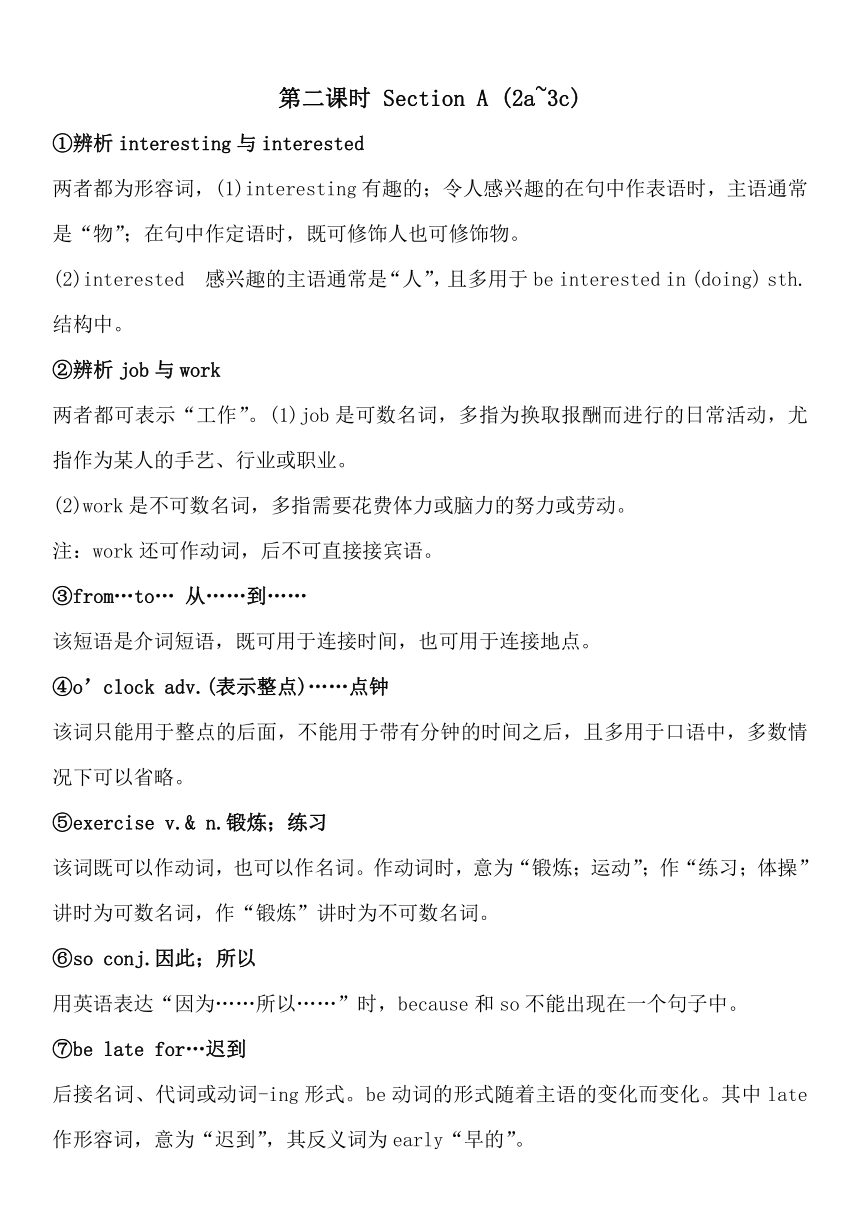Unit 2 What time do you go to school? Section A (2a~3c)学案(含答案) 人教版七年级英语下册
文档属性
| 名称 | Unit 2 What time do you go to school? Section A (2a~3c)学案(含答案) 人教版七年级英语下册 |

|
|
| 格式 | docx | ||
| 文件大小 | 17.5KB | ||
| 资源类型 | 教案 | ||
| 版本资源 | 人教新目标(Go for it)版 | ||
| 科目 | 英语 | ||
| 更新时间 | 2024-05-06 22:54:17 | ||
图片预览


文档简介
第二课时 Section A (2a~3c)
①辨析interesting与interested
两者都为形容词,(1)interesting有趣的;令人感兴趣的在句中作表语时,主语通常是“物”;在句中作定语时,既可修饰人也可修饰物。
(2)interested 感兴趣的主语通常是“人”,且多用于be interested in (doing) sth.结构中。
②辨析job与work
两者都可表示“工作”。(1)job是可数名词,多指为换取报酬而进行的日常活动,尤指作为某人的手艺、行业或职业。
(2)work是不可数名词,多指需要花费体力或脑力的努力或劳动。
注:work还可作动词,后不可直接接宾语。
③from…to… 从……到……
该短语是介词短语,既可用于连接时间,也可用于连接地点。
④o’clock adv.(表示整点)……点钟
该词只能用于整点的后面,不能用于带有分钟的时间之后,且多用于口语中,多数情况下可以省略。
⑤exercise v.& n.锻炼;练习
该词既可以作动词,也可以作名词。作动词时,意为“锻炼;运动”;作“练习;体操”讲时为可数名词,作“锻炼”讲时为不可数名词。
⑥so conj.因此;所以
用英语表达“因为……所以……”时,because和so不能出现在一个句子中。
⑦be late for…迟到
后接名词、代词或动词-ing形式。be动词的形式随着主语的变化而变化。其中late作形容词,意为“迟到”,其反义词为early“早的”。
⑧group n.组;群
常用短语:a group of一组……;一群……,其后接可数名词复数。
注:group为集合名词,作主语时,若作为一个整体看,谓语动词用单数;若强调其中的成员,谓语动词用复数。
⑨on weekends(在)周末
通常作一般现在时的时间状语。表示“(在)周末”也可用on the weekend,英式英语中也用at the weekend。
Ⅰ.按要求完成下列各题。
A)根据括号中的提示完成单词。
1.job(近义词) work
2.brush(第三人称单数形式) brushes
3.funny(名词形式) fun
4.tooth(复数形式) teeth
B)根据中文提示翻译下列短语。
5.起床 get up
6.穿上衣服 get dressed
7.淋浴 take a shower
8.吃早餐eat/have breakfast
Ⅱ.单项填空。
(C)9.Lucy and Lily usually watch TV 8:30 9:30 at night.
A.at;to B.from;at
C.from;to D.at;from
(B)10.Jenny has a new .She in a school.
A.job;jobs B.job;works
C.work;works D.work;jobs
(A)11.—Do you like computer games
—No,I play them.
A.never B.always
C.usually D.sometimes
(C)12.—The storybook is .My classmates are in it.
—Really I want to watch it,too.
A.interesting;interesting
B.interested;interested
C.interesting;interested
D.interested;interesting
Ⅲ.根据句意,用括号中所给词的适当形式填空。
13.There are two bus stations in our city.(station)
14.I get up early and get dressed quickly.(dress)
15.This group of boys often play basketball after school.(play)
16.The dog can dance.It looks so funny.(fun)
Ⅳ.将下列句子中中文部分译成英语,注意使用适当的形式。
e on.I don’t want to be late for school.(迟到)
18.Mary must get up early from Monday to Friday,but she can sleep(睡觉) late
on weekends/on the weekend.(在周末)
19.He gets up at 6:30,and then does morning exercises at 7:30.(做早操)
20.It is relaxing to take/have a shower after a day’s work.(淋浴)
①辨析interesting与interested
两者都为形容词,(1)interesting有趣的;令人感兴趣的在句中作表语时,主语通常是“物”;在句中作定语时,既可修饰人也可修饰物。
(2)interested 感兴趣的主语通常是“人”,且多用于be interested in (doing) sth.结构中。
②辨析job与work
两者都可表示“工作”。(1)job是可数名词,多指为换取报酬而进行的日常活动,尤指作为某人的手艺、行业或职业。
(2)work是不可数名词,多指需要花费体力或脑力的努力或劳动。
注:work还可作动词,后不可直接接宾语。
③from…to… 从……到……
该短语是介词短语,既可用于连接时间,也可用于连接地点。
④o’clock adv.(表示整点)……点钟
该词只能用于整点的后面,不能用于带有分钟的时间之后,且多用于口语中,多数情况下可以省略。
⑤exercise v.& n.锻炼;练习
该词既可以作动词,也可以作名词。作动词时,意为“锻炼;运动”;作“练习;体操”讲时为可数名词,作“锻炼”讲时为不可数名词。
⑥so conj.因此;所以
用英语表达“因为……所以……”时,because和so不能出现在一个句子中。
⑦be late for…迟到
后接名词、代词或动词-ing形式。be动词的形式随着主语的变化而变化。其中late作形容词,意为“迟到”,其反义词为early“早的”。
⑧group n.组;群
常用短语:a group of一组……;一群……,其后接可数名词复数。
注:group为集合名词,作主语时,若作为一个整体看,谓语动词用单数;若强调其中的成员,谓语动词用复数。
⑨on weekends(在)周末
通常作一般现在时的时间状语。表示“(在)周末”也可用on the weekend,英式英语中也用at the weekend。
Ⅰ.按要求完成下列各题。
A)根据括号中的提示完成单词。
1.job(近义词) work
2.brush(第三人称单数形式) brushes
3.funny(名词形式) fun
4.tooth(复数形式) teeth
B)根据中文提示翻译下列短语。
5.起床 get up
6.穿上衣服 get dressed
7.淋浴 take a shower
8.吃早餐eat/have breakfast
Ⅱ.单项填空。
(C)9.Lucy and Lily usually watch TV 8:30 9:30 at night.
A.at;to B.from;at
C.from;to D.at;from
(B)10.Jenny has a new .She in a school.
A.job;jobs B.job;works
C.work;works D.work;jobs
(A)11.—Do you like computer games
—No,I play them.
A.never B.always
C.usually D.sometimes
(C)12.—The storybook is .My classmates are in it.
—Really I want to watch it,too.
A.interesting;interesting
B.interested;interested
C.interesting;interested
D.interested;interesting
Ⅲ.根据句意,用括号中所给词的适当形式填空。
13.There are two bus stations in our city.(station)
14.I get up early and get dressed quickly.(dress)
15.This group of boys often play basketball after school.(play)
16.The dog can dance.It looks so funny.(fun)
Ⅳ.将下列句子中中文部分译成英语,注意使用适当的形式。
e on.I don’t want to be late for school.(迟到)
18.Mary must get up early from Monday to Friday,but she can sleep(睡觉) late
on weekends/on the weekend.(在周末)
19.He gets up at 6:30,and then does morning exercises at 7:30.(做早操)
20.It is relaxing to take/have a shower after a day’s work.(淋浴)
同课章节目录
- Unit 1 Can you play the guitar?
- Section A
- Section B
- Unit 2 What time do you go to school?
- Section A
- Section B
- Unit 3 How do you get to school?
- Section A
- Section B
- Unit 4 Don't eat in class.
- Section A
- Section B
- Unit 5 Why do you like pandas?
- Section A
- Section B
- Unit 6 I'm watching TV.
- Section A
- Section B
- Review of Units 1-6
- Unit 7 It's raining!
- Section A
- Section B
- Unit 8 Is there a post office near here?
- Section A
- Section B
- Unit 9 What does he look like?
- Section A
- Section B
- Unit 10 I'd like some noodles.
- Section A
- Section B
- Unit 11 How was your school trip?
- Section A
- Section B
- Unit 12 What did you do last weekend?
- Section A
- Section B
